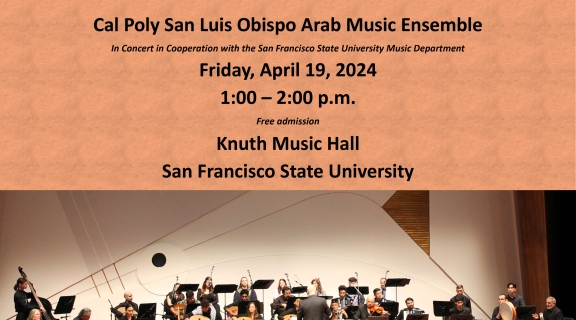
Cal Poly Arab Music Ensemble, Guest Performance
Overview
The Cal Poly Arab Music Ensemble performs the art and popular music of a wide range of Arabic-speaking societies and historically related cultures while particularly focusing on the areas around the Eastern Mediterranean. Arab art music has intersected substantially with folk and religious musical traditions and has benefited deeply from the contributions of interconnected social groups including men and women of diverse ethnic, religious, and philosophical backgrounds. It also has connected historically to neighboring cultures of the larger region including those of Iranian and Turkish music. The repertoire of the Arab Music Ensemble comprises pieces ranging from the Ottoman era up to the present and includes some of the longest performed genres of music in the world. The music is rooted in the traditional systems of melodic and metric modes (maqam and iqa` systems), and takes the form of instrumental improvisation (taqsim), vocal improvisation (layali and mawwal), and pre-composed works in many formal genres (e.g., dulab, samai, and muwashshah). Traditional instruments in play include the oud (fretless lute), kamanja (violin), nay (reed flute), qanun (trapezoidal zither), riqq or daff (tambourine), darabukka or tabla (goblet drum), and others. Consistent with developments in composition and performance practice over the past century, the ensemble also adapts Euro-American instruments including the bass, cello, accordion, guitar, and drum set as well as Latin percussion, brass, and other instrumentation.
A suite of instrumental and vocal pieces celebrated across Arab society will be at the core of the program. They feature a wide range of rhythmic modalities and range from two to 17 beats per measure. Among them are examples of the muwashshah, a genre of poetry and music that stems from 10th-century Andalusia in the southern Iberian Peninsula. A celebrated Romanian folksong and an endeared Palestinian and Iraqi anthem will also be performed.
Composers, poets and artists that will be represented in the works performed include Anton Pann, Badi` Khayri, Farid al-Atrash, Ibrahim Touqan, Mohammed Flayfel, and Sayyid Darwish.
Ken Habib, a composer, performer and ethnomusicologist, will direct the event. The program will include one of his original compositions and arrangements. Habib is a professor of music at Cal Poly San Luis Obispo. Previously he served as the Associate Director of the Middlebury College Arabic School, taught music at Pomona College and UCSB, and taught Arabic at Cuesta College and Santa Barbara City College. He earned a Ph.D. in ethnomusicology and a Graduate Certificate in College and University Teaching from UCSB, an M.A. in music composition from UCSB, and a BA in communications studies from UCLA. The main areas of his research involve the art and popular music cultures of Lebanon, of larger West Asia North Africa, and of the United States. His articles appear in publications including The Encyclopedia of Islam, The Grove Dictionary of American Music, The Journal of Popular Music Studies, The Oxford Bibliographies in Islamic Studies, and The SAGE International Encyclopedia of Music and Culture as well as on NPR’s Afropop Worldwide. His original compositions of music and poetry include his albums of Arab art music (Salam) and American art song (child in me).
The Arab Music Ensemble is an orchestra and choir with vocal and instrumental soloists. Its membership represents a range of majors on campus and professions off campus.
Annual tours such as this are part of the ensemble’s educational mission of fostering intellectual, artistic, and cultural exchange with audiences, colleagues, and friends beyond the San Luis Obispo area.
Program
- Dulab Hijaz (Traditional)
- Samai Hijaz (Ken Habib)
- Namma Dam`i (Sayyid Darwish, 1892 – 1923)
- Salla Fina al-Lahza Hindiyya (Sayyid Darwish, 1892 – 1923)
- Shidd al-Hizam (Sayyid Darwish, 1892 – 1923)
- Ah Ya Zayn (Traditional, arr. Ken Habib)
- Helene Shalhoub: vocal solo
- Cobalt Strahle: clarinet solo
- Nu Mai Poci de Ostenit (Traditional)
- Maria Stanculescu: vocal solo
- Linda Ashworth: oboe solo
- Mawtini (Mohammed Flayfel, 1899 – 1986)
- Roula Matouk: vocal solo
- Tuta (Farid al-Atrash, 1910 – 1974)